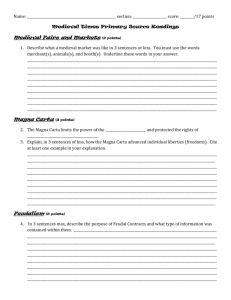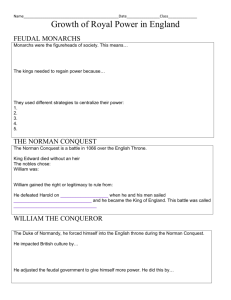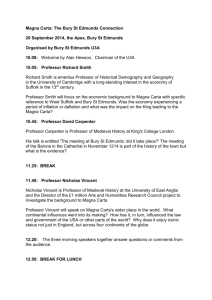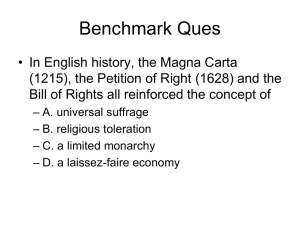Professor Robert Tombs - Franco
advertisement
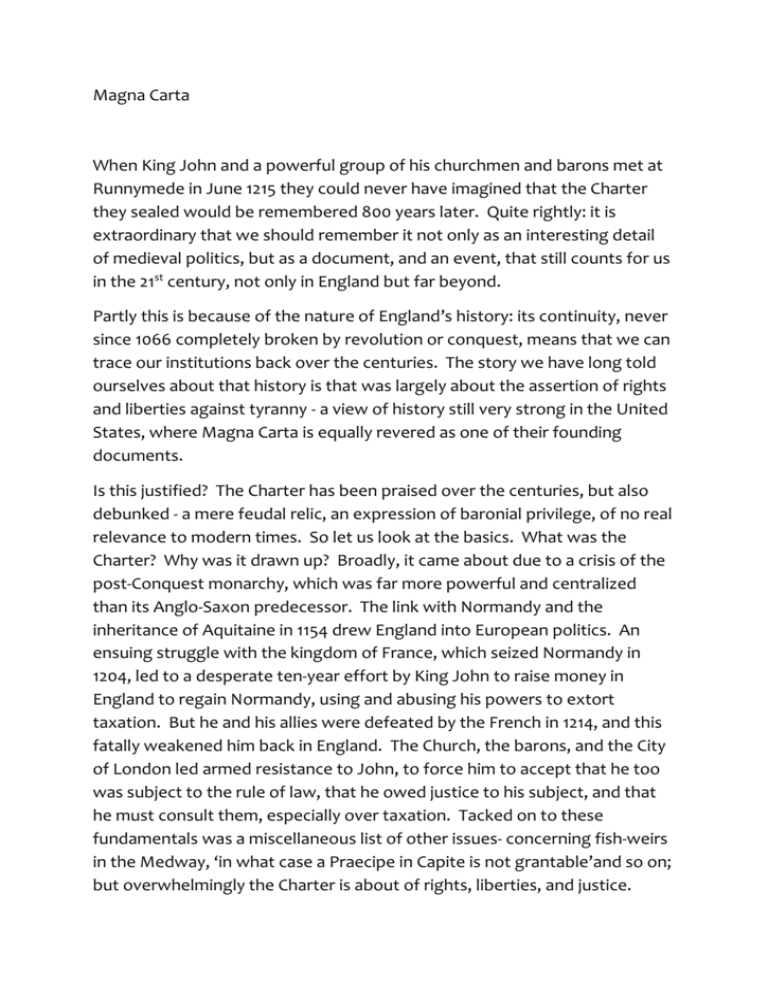
Magna Carta When King John and a powerful group of his churchmen and barons met at Runnymede in June 1215 they could never have imagined that the Charter they sealed would be remembered 800 years later. Quite rightly: it is extraordinary that we should remember it not only as an interesting detail of medieval politics, but as a document, and an event, that still counts for us in the 21st century, not only in England but far beyond. Partly this is because of the nature of England’s history: its continuity, never since 1066 completely broken by revolution or conquest, means that we can trace our institutions back over the centuries. The story we have long told ourselves about that history is that was largely about the assertion of rights and liberties against tyranny - a view of history still very strong in the United States, where Magna Carta is equally revered as one of their founding documents. Is this justified? The Charter has been praised over the centuries, but also debunked - a mere feudal relic, an expression of baronial privilege, of no real relevance to modern times. So let us look at the basics. What was the Charter? Why was it drawn up? Broadly, it came about due to a crisis of the post-Conquest monarchy, which was far more powerful and centralized than its Anglo-Saxon predecessor. The link with Normandy and the inheritance of Aquitaine in 1154 drew England into European politics. An ensuing struggle with the kingdom of France, which seized Normandy in 1204, led to a desperate ten-year effort by King John to raise money in England to regain Normandy, using and abusing his powers to extort taxation. But he and his allies were defeated by the French in 1214, and this fatally weakened him back in England. The Church, the barons, and the City of London led armed resistance to John, to force him to accept that he too was subject to the rule of law, that he owed justice to his subject, and that he must consult them, especially over taxation. Tacked on to these fundamentals was a miscellaneous list of other issues- concerning fish-weirs in the Medway, ‘in what case a Praecipe in Capite is not grantable’and so on; but overwhelmingly the Charter is about of rights, liberties, and justice. There is no theory, no ideology – just concrete, practical rules for government. Charters between rulers and subjects were common. At about this time, there were several in France and Spain that in some ways resembled, and preceded, Magna Carta - the Charter of Catalonia (1205) or the Statute of Pamiers (1212), for example, given by Simon de Montfort the elder, which prohibits the sale of justice, and gives rights to heirs and widows – and which might partly have inspired Magna Carta, which also promised those very things. But Magna Carta was different, and it was to have a very different future. First, it was permanent. Second, it covered the whole kingdom. Third, it concerned everyone: not only barons and clerics, but ‘all freemen’, and with some rights recognized for everyone, including women. One expert has argued that the Latin word ‘homines’ meant not just ‘men’, but ‘people’. To quote the charter’s actual words: The men [or ‘people’] of our realm shall have and hold all the aforesaid liberties, rights and concessions , well and peacefully, freely and quietly, fully and completely, for them and their heirs of us and our heirs in all things and places for ever. The first version of the Charter also included a committee of barons to force the king to keep its provisions, and also an oath to uphold the Charter to be taken by the whole ‘community of the realm’ - a key phrase, which included everyone. King John almost immediately renounced the Charter and got the Pope to condemn it, and this led to civil war, to French and Scottish intervention, and it looked for a time like putting a French prince on the English throne as Louis I - quite a thought! But John died in 1216, his young son was proclaimed Henry III, and things calmed down. A modified version of the Charter was reissued in the new king’s name, and thereafter was regularly reissued, copied and circulated throughout the kingdom in large numbers (my college found a 14th century copy recently in its archives, bound up with documents concerning bread and ale). So it was not only, or even mainly, what happed in 1215 that counted, but what happened afterwards, as the Charter was repeatedly read out and invoked by ordinary people as well as by lawyers in following centuries. But this was only the start of the Charter’s long story. Indeed, it became for a long time less important, being overtaken by other statutes and common law practices - for example, the adoption of trial by jury, and the use of the writ of habeas corpus (protecting against detention without trial). During the 15th and 16th centuries, Magna Carta seems to have been largely forgotten. But it revived during the early 17th century, during the reign of James I and Charles I, and this is really a reinvention of the Charter, arguably more important than its original creation. The original Charter was not a coherent statement of political theory: but it inspired political theories in later centuries. It was recreated by lawyers and politicians - particularly the choleric Chief Justice and MP Sir Edward Coke- to contest the prerogative rights of the Stuart kings, drawing on Roman Law, and the Charter was now given a new and powerful interpretation. It was no longer seen as a compromise deal between King John and his barons, but as the resurrection of an ‘ancient constitution’ believed to have been already there in the days of the Anglo-Saxons, and suppressed temporarily by the Norman Conquest. Magna Carta was, Coke declared, in its ‘great weightinesse and weightie greatnesse’, the very ‘fountaine of all the fundamentall lawes of the realm’ and a ‘restitution of the common law’. This idea became very powerful: that there were rights, political and legal, that were inherent in being English, and which had been given by no individual, and therefore could be taken away by no individual - namely, in this case, by James I. Magna Carta thus became the keystone of what was seen as a fundamental law, a constituting document of the nation. This became a remarkably consistent theme of the English political imagination. An 18th century French commentator observed that there was a far greater probability of success in raising among the English people the notions (familiar to them) of long-established customs, than in arguing with them from the no less rational, but less determinate and somewhat dangerous doctrines concerning the original rights of Mankind. [deLolme, Pall. 5-6] After being invoked by opponents of the Stuarts, the Charter influenced the 1689 Bill of Rights, which a leading politician called ‘our second Magna Carta’ [Pall p 41]. Eighteenth-century radicals, such as John Wilkes and Thomas Paine, and their American counterparts, used Magna Carta to argue against the ruling establishment; and the Charter continues to be cited in the American Supreme Court today. Nineteenth-century democrats, such as the Chartists (advocates of a democratic ‘People’s Charter’) echoed the idea of an ‘ancient constitution’. It was a powerful and attractive idea because it was not a request, a plea, to be given rights by the ruling elite: it was an insistence that those rights already existed, but had been wrongly taken away. Radicals thus denied the very legitimacy of the established system. Magna Carta combined both radicalism and patriotism - it enshrined the rights of what were habitually termed ‘true-born Englishmen’. The Déclaration des Droits de l’Homme et du Citoyen was significantly different. France had no comparable belief in traditional rights or an ancient constitution that was the birthright of all Frenchmen: necessarily therefore, it had to draw on ideas of ‘natural rights’ as opposed to inherited rights, and thus it had a universal significance that Magna Carta never claimed. The American Declaration of Independence and Bill of Rights had somehow combined the ideas of birthright and universal rights. The French Revolution drew more heavily still on abstract principles - though there is arguably some tension between universalism (the Rights of Man) and particularism (the rights of the Citizen). But in both cases, the French revolutionaries (while apparently consulting Thomas Jefferson) were conscious of doing something new - a very shocking idea to medieval thinkers, and even to Edmund Burke, who revived the idea of traditional rights in contrast to the ‘fairy land of philosophy’ he condemned in the French Revolution. That summarizes, very briefly, the history of Magna Carta. But in celebrating it, we must not forget one very obviouscautionary reflection: the invocation of Magna Carta as a source of rights has often, indeed usually, been ineffective. King John renounced it. Henry VIII ignored it. The Stuarts were defeated not by words and argument but by two revolutions. The American patriots needed bullets as well as declarations; moreover their declarations of their own freedom helped neither dispossessed native Americans nor enslaved Africans(‘the loudest yelps for freedom’, sneered Samuel Johnson, ‘come from the drivers of slaves’). The Chartists failed to get their ‘People’s Charter’ and democracy came to Britain only in the aftermath of the First World War - seven centuries after Runnymede. Moreover, there is a deep ambiguity, even a contradiction, at the heart of our political history. On one hand, in Magna Carta, there is the vision of what Pitt the Elder called ‘the bible of the English constitution’, with its core of inalienable inherited liberties, based on the notion of fundamental law derived from an ‘ancient constitution’. On the other hand, we have the contrary idea of a sovereign parliament which can never be bound by the acts of its predecessors, and which can do anything: as the great nineteenthcentury constitutional lawyer Dicey defined it: Parliament … has, under the English constitution, the right to make or unmake any law whatever; … no person or body is recognized by the law of England as having a right to override or set aside the legislation of Parliament. We can see this in the case of habeas corpus, a traditional common law procedure protecting against arbitrary detention; in 1679 parliament passed a Habeas Corpus Act, giving it statutory force - but this meant, ironically, that parliament gave itself the power, which it has used in emergencies, of suspending Habeas Corpus and permitting detention without trial. In short, parliament, not Magna Carta or an ‘ancient constitution’, decides what our rights are: and in recent years parliament has contemplated extended periods of detention, and restricting trial by jury in some criminal cases - two things that most people would probably consider the heart of Magna Carta. So is Magna Carta just a myth, and is its celebration merely sentimental nostalgia, or worse a smokescreen concealing reality? So it has often been in the past, and so it arguably is now. But ‘myth’ is nevertheless important: it helps to shape people’s deepest feelings and instincts about what is right and permissible. Throughout its history, Magna Carta has indeed been a myth of this kind, but a powerful myth. It convinced people that they had rights - and this is not, even now, a self-evident idea. It convinced people that their rulers could not do as they wished - again, even now not selfevident. It made rulers themselves cautious - even today, no British or American politician would dare to say openly that Magna Carta was an archaic feudal relic whose principles they intended to ignore. So certain basic ideas entered the culture: ideas about justice, about people’s rights, about the duties of rulers. These ideas, wrote Edmund Burke, became ‘engraved in the hearts of Englishmen’. To shape the visceral culture of politics and law as Magna Carta did is hugely important: a general belief that some things must be done and others must not be done is one defence - perhaps the most solid defence we have against the abuse of power: ‘to no man will we sell, to none deny, or delay justice or right’. But even accepting certain principles as inviolable, though important, is not enough, as again the history of Magna Carta repeatedly shows: the mere existence of charters and laws is only part of the story. People have to be willing to invoke them, to use them as weapons, as the brave, cantankerous and probably pretty unbearable Sir Edward Coke did against James I. This does not always work: but no law, no declaration, no system of jurisprudence is perfect or perfectly effective. Feelings, after all, are sometimes stronger than institutions–feelings are sometimes the best things we have. Celebrating these feelings, these myths if you like about the rights and justice enshrined in the Charter, as we are doing now, strengthens them. Or so I hope. Let me finish by recalling briefly the main points of what happened 800 years ago. The king, the source of law and sovereignty, was forced to accept that he too came under law, that his powers were limited, that he had to do justice, that the participation and consent of the people was required for government, that all people had some rights, and that there was a ‘community of the realm’ made up of all its people, and not merely a royal dominion over passive subjects. Moreover these rights were conceded ‘to all men, in all places, forever’. Not all of this was new or unique, but as a whole it was, and it was realized to be. John soon renounced the Charter - but his people didn’t, and his successors had to accept and reissue it. And it was kept alive over the centuries as a conviction that somehow there existed a source of rights - an ‘ancient constitution’ - that had always been there, and did not depend on the will of any monarch or parliament, who therefore could not legitimately take them away. Later centuries, and other countries, had different ways of expressing this idea: that divine law, or natural law (as in the French Revolution), or international agreement, laid down what human rights were. I’m not sure that these ways have been more effective - or even as effective - as that intellectually primitive and rather incoherent sheet of parchment sealed at Runnymede 800 years ago. Professor Robert Tombs



